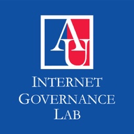Olga Khrustaleva is a PhD student at American University's School of Communication
By Kenneth Merrill
Most Internet users are familiar with status code 404 “Not Found,” used when a requested web page is unavailable. Less recognizable, at least until recently, was status code 451, a new protocol standardized in 2016 and used to signal when a requested resource is unavailable “for legal reasons.” A reference to Ray Bradbury’s dystopian novel Fahrenheit 451, the new status code applies to resources inaccessible for a host of legal considerations, including national security, copyright violations, privacy, and local laws proscribing certain types of content (e.g. hate speech, blasphemy laws, etc.).
Last week, SOC Ph.D. Candidate and Internet Governance Law fellow Olga Khrustaleva, who this summer is working as an Internet of Rights fellow with Article 19, a London-based digital rights advocacy group, presented research at the 99th meeting of the Internet Engineering Task Force (IETF) in Prague on the implications of status code 451 for human rights, both globally and in various national contexts. Using a web crawler that searches top-level resources for content being blocked or otherwise censored, the crawler reports any instances of 451 status codes and analyzes them to see what categories of content are being blocked where.
Using a web crawler that searches top-level resources for content being blocked or otherwise censored, the crawler reports any instances of 451 status codes and analyzes them to see what categories of content are being blocked where.
While the project is in its early stages — the research tools were unveiled at an IETF-sponsored “hackathon” in Prague last week — initial findings focusing on Reddit in Turkey showed that LGBT content was among the largest categories of content returning the status code. Similarly, the tools are being used to investigate occurrences of status code 451 in Russia, where LinkedIn was recently blocked due to the company’s refusal to comply with the country’s data localization law.
The researchers expect to augment these initial findings with data collected from the team’s browser extension, with the goal of extending the project to other national contexts going forward. As Ms. Khrustaleva explains, “status code 451 makes digital censorship more transparent and gives more clarity to the end users who get a better idea why the page they are trying to access is unavailable.” But understanding how the code is used and under what circumstances will help shed light on how content filtering is implemented across national contexts.

